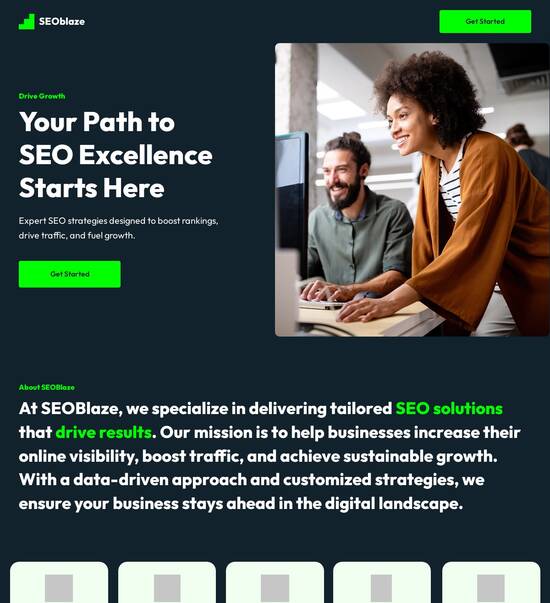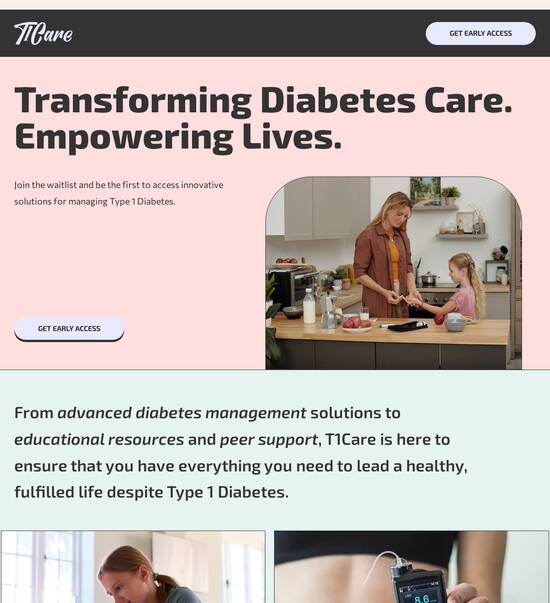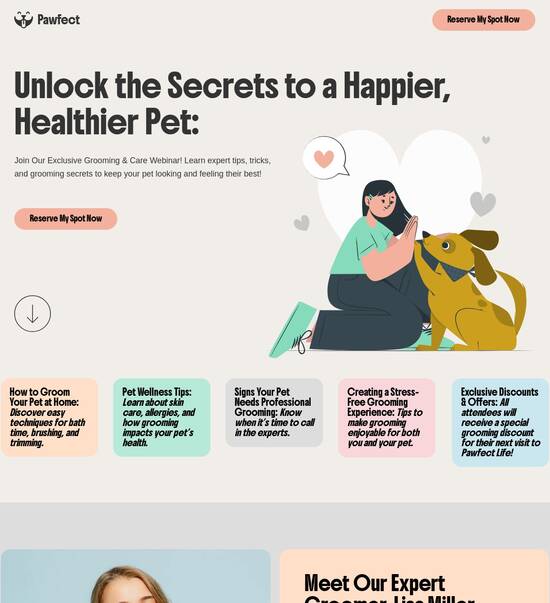
HTML page templates with user profiles
Explore Similar TemplatesAbout template
Manage your templates with user profiles and improve your conversion rates. Easily facilitate trust and transparency with your customers right now.
Recommended templates

Easy to build without coding
With the intuitive drag-and-drop builder, anyone on your team can create high-converting pages without any knowledge of code or design. Make enhancements to your landing page with custom widgets using Javascript, HTML/CSS, or third-party scripts.

Multiple layouts for any industry and goal
Select from 500+ landing page layouts built to boost conversions across industry-specific scenarios. Customize them by adjusting fonts, adding images, and generating on-brand content with the AI assistant. Quickly scale with Instablocks® and Global Blocks that you can save, reuse, and update globally.

Loads fast and looks polished on any device
Every template is responsive, which means they present professionally on any device and load blazingly fast with our Thor Render Engine. You can also power them up with Google AMP technology to deliver an unparalleled mobile experience and drive higher conversions.

Robust analytics & experimentation
Get real-time updates and reporting across all your devices, showing the number of visitors, conversions, cost-per-visitor, and cost-per-lead. Launch AI-powered experiments, run A/B tests, and use heatmaps to analyze user behavior, then optimize your landing page to maximize conversions.







Easy to build without coding
With the intuitive drag-and-drop builder, anyone on your team can create high-converting pages without any knowledge of code or design. Make enhancements to your landing page with custom widgets using Javascript, HTML/CSS, or third-party scripts.
Multiple layouts for any industry and goal
Select from 500+ landing page layouts built to boost conversions across industry-specific scenarios. Customize them by adjusting fonts, adding images, and generating on-brand content with the AI assistant. Quickly scale with Instablocks® and Global Blocks that you can save, reuse, and update globally.
Loads fast and looks polished on any device
Every template is responsive, which means they present professionally on any device and load blazingly fast with our Thor Render Engine.
Robust analytics & experimentation
Get real-time updates and reporting across all your devices, showing the number of visitors, conversions, cost-per-visitor, and cost-per-lead. Launch AI-powered experiments, run A/B tests, and use heatmaps to analyze user behavior, then optimize your landing page to maximize conversions.
All the features you need to build user profile page template html css
Explore more featuresLearn how to build user profile page html code
Frequently asked questions about user profile html css
Leading the way in building high-performing landing pages





Html profile page template: Your ultimate how-to guide
Instapage empowers marketers to create high-converting landing pages that drive digital marketing success. With its powerful features tailored for a variety of industries such as business services, tech, education, and financial services, Instapage's platform makes optimizing your campaigns accessible regardless of your team size or budget.
Understanding the Basics of Landing Page Creation
Creating effective landing pages using Instapage begins with understanding your target audience. Analyze their needs and tailor your content to ensure higher conversion rates. Utilize Instapage's library of 100+ conversion-focused templates to kickstart your design process.
- Choose a template that aligns with your campaign goals: Instapage offers a variety of templates that cater to different industries, making it easier to find a design that resonates with your audience.
- Customize lead generation elements: Adapt elements like forms and CTAs to ensure they effectively capture leads that are relevant to your business.
- Use effective imagery and headlines: High-quality visuals and compelling headlines can significantly impact how visitors perceive your landing page.
Steps to Optimize Your Landing Pages
Once your landing page is set up, optimization is key to maximizing performance. Effective tools are built into Instapage for seamless testing and enhancement.
- Utilize A/B testing: Experiment with different versions of your landing page to see which elements perform better, helping you refine your strategy over time.
- Implement heatmaps for user behavior insights: Analyze how visitors interact with your page to identify areas for improvement.
- Monitor conversion analytics: Keep track of metrics through Instapage's analytics dashboard to assess the performance of your campaigns.
Personalization & Collaboration Features
Instapage allows for personalized experiences on your landing pages, enhancing user engagement. Use personalization tools and collaborate with your team for faster execution.
- Dynamic text replacement: Automatically modify text to match user search queries and demographics.
- Feedback and Real-time collaboration: Enable team members to offer instant feedback and make edits collaboratively, reducing the time from concept to execution.
- Sharing capabilities: Instapage allows you to securely share landing pages with external stakeholders for insights and approvals.
By leveraging these features, marketers can significantly enhance their landing pages, streamline collaboration processes, and ultimately increase conversion rates.
In conclusion, Instapage provides the necessary tools to create, optimize, and personalize landing pages that cater specifically to your target markets in the USA.
Ready to take your digital marketing campaigns to the next level? Start free with Instapage today and transform your landing pages into powerful conversion tools!
People also ask about user profile page design in html with source code
Crafting user profiles with HTML page templates: A deep dive into functionality and benefits
Understanding HTML page templates
HTML page templates provide a foundational framework for web development, allowing developers to create consistent layouts quickly. They serve as blueprints, ensuring that elements such as headers, footers, and navigation are uniform across multiple pages. This consistency is especially vital for user profiles where a professional look conveys trust and reliability to visitors.
In the context of user profiles, HTML page templates help create structured sections that enhance readability and user experience. These templates ensure that user details are displayed coherently, making it easy for visitors or users to navigate through different sections of a profile.
The role of user profiles in modern web applications
User profiles are crucial elements in many modern web applications. They serve as personal spaces where users can display their information, preferences, and activities. Platforms like LinkedIn use user profiles to showcase professional accomplishments, while social networks such as Facebook allow users to connect with friends and share updates.
Understanding how to effectively design and implement these profiles can dramatically enhance user engagement and retention rates. A well-crafted user profile fosters community, encourages interaction, and provides users with a sense of ownership and personalization.
The anatomy of an HTML page template for user profiles
A successful user profile template encompasses several essential components. The header usually includes the logo, navigation links, and the user's name prominently displayed, ensuring easy access to essential areas of the website. The main profile section typically features the user's photo, a brief bio, and important details like contact information or website links.
Additionally, an activity feed is often integrated, showcasing the user’s recent actions or interactions, making it easy for others to engage. Such features not only enhance the aesthetics of the profile but also provide functional benefits that boost user interaction.
Integrating responsive design
Given the wide array of devices available today, integrating responsive design is crucial. Responsive user profiles ensure seamless functionality across desktops, tablets, and smartphones. With a responsive design, users enjoy consistent experiences, which is vital for keeping them engaged on the platform.
Using CSS frameworks like Bootstrap can significantly aid in achieving flexibility. These frameworks come with built-in classes that help developers rapidly create responsive layouts without having to start from scratch, facilitating efficient design practices.
Leveraging JavaScript to enhance user profiles
JavaScript plays a pivotal role in making user profiles interactive. By defining functions that enable dynamic content updates, developers can create profiles that respond to user actions in real-time. For instance, users can edit or save their profile information without needing to reload the entire page, improving user experience.
The use of `document.addEventListener` facilitates event-driven programming, allowing developers to respond to user interactions such as clicks, form submissions, or mouse movements. Code snippets illustrating these JavaScript functions illustrate how to bring profiles to life by adding functionality that encourages users to interact with their information.
Optimizing performance with iolazy
iolazy is a powerful tool designed to enhance web performance through lazy loading of images. By delaying the loading of off-screen images, it ensures that only visible elements are initially loaded, thus speeding up the webpage's load time. This is particularly beneficial for user profiles, which often contain multiple images, such as profile photos and gallery images.
Incorporating iolazy requires following simple steps, including integrating the iolazy library and adjusting image tags. While there may be challenges during implementation, such as handling various browser compatibilities, the performance gains achieved with decreased load times and improved user experience are well worth the effort.
Ensuring robustness with DOMContentLoaded
The DOMContentLoaded event is essential for enhancing the user experience in profile rendering. This event triggers when the initial HTML document has been completely loaded and parsed, allowing developers to start executing scripts immediately. This ensures that users have access to dynamically generated content right away without waiting for images and stylesheets to finish loading.
Practical applications of DOMContentLoaded include rendering user-specific elements, such as greetings or recent activity updates. By employing this event effectively, developers can prepare their scripts to execute only once the necessary elements are ready, leading to faster interactions and a more responsive feel.
Building an engaging user experience
An engaging user experience is vital for retaining users and encouraging them to interact with the platform regularly. Personalization features, such as customizable themes, colors, and layouts, allow users to tailor their profiles according to their taste. This sense of ownership not only boosts satisfaction but also promotes a deeper connection with the platform.
Incorporating social media and external links within user profiles facilitates better interactions and expands the users' network. By giving users easy access to share their profiles or connect on other platforms, websites can create vibrant communities. This approach enhances interaction, fostering a sense of belonging among users.
Technical best practices and considerations
Security is paramount in user profile templates. With user data being a significant target for cyber threats, implementing robust security measures must be prioritized. Common vulnerabilities include inadequate data protection practices, which can jeopardize user privacy. Adhering to best practices, such as input validation, encryption, and secure storage solutions, can reduce these risks significantly.
In terms of performance optimization, a few key techniques can minimize load times and improve user experiences. These include optimizing images to reduce their sizes, minifying CSS and JavaScript files for faster requests, and implementing caching strategies. By keeping performance at the forefront, developers ensure that user profiles load efficiently, encouraging users to engage rather than abandon the page due to frustrating load times.
Real-world applications and case studies
Many successful implementations of user profiles can be observed in popular platforms like Twitter and Instagram. These sites use HTML page templates effectively to create profiles that are visually appealing and user-friendly. Strategies like concise layouts and interactive elements set these profiles apart, offering users seamless navigation and interactions.
Lessons learned from these case studies reveal the significance of user feedback in the design process. By continuing to adapt and innovate based on user preferences, developers can stay ahead in the evolving landscape of user profile functionalities.
Conclusion: The transformative impact of HTML templates on user profiles
The implementation of HTML page templates has revolutionized how user profiles are structured and experienced. The advantages of crafting tailored templates extend beyond aesthetics; performance enhancements and robust frameworks enhance user engagement substantially. A well-designed profile not only captures the essence of the user but also fosters meaningful connections within the platform.
Looking ahead, the landscape of user profiles is poised for significant growth, driven by advancements in technology and shifting user expectations. As web applications continue to evolve, it will be crucial for developers to keep pace with these trends by continually refining profile functionalities and personalizing user experiences.
Ready to skyrocket conversions?
Supercharge your ad campaigns with high-performing landing pages
Get started














